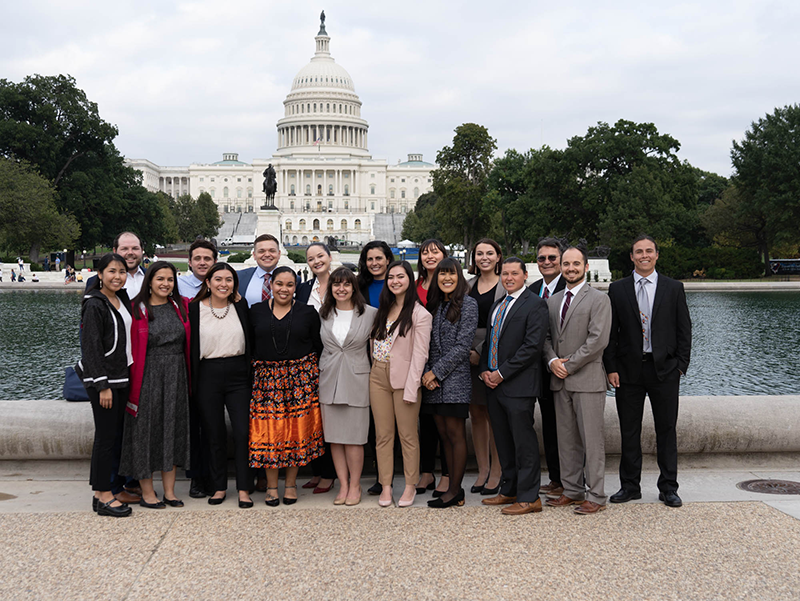Monthly Archives: November 2021
We Conquered

On Oct. 11, we held a free one-hour webinar “Conquering Columbus: Dismantling the Doctrine of Discovery.”
We appreciate our panel experts—Native Vote Fellow Torey Dolan (’19), Sarah Augustine, Douglas Lind and Professor Robert J. Miller—for leading this rising awareness discussion and helping ensure the academic landscape represents Indian Country’s full diversity and history at a national scale.
If you missed the webinar, you may watch the recording.
ILP Family legacy
Native American Heritage Month
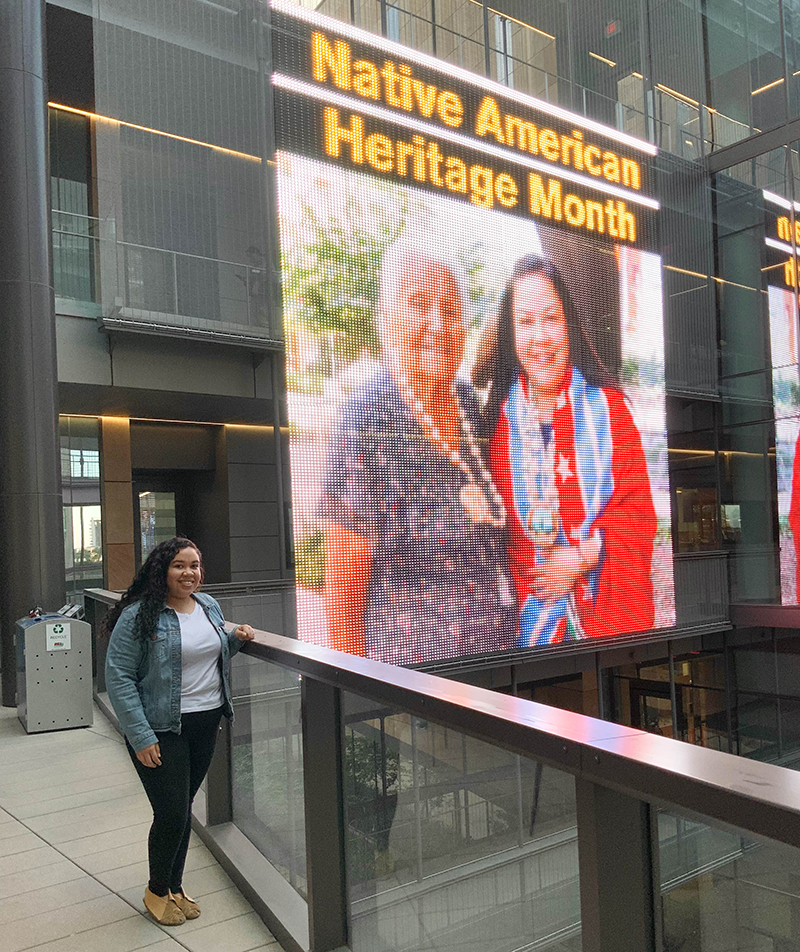
As a team representing 10 tribes at the Sandra Day O’Connor College of Law, the Indian Legal Program aims to educate and celebrate on the ancestral lands of the Akimel O’odham. The program was established 33 years ago by the efforts of two ASU Law students – Gloria Kindig (’89) and LynDee Wells (’89). Over the years, we have excelled and built on that vision and created the Indian Legal Clinic, the Arizona Native Vote Election Protection Project, the Indian Wills Clinic, the Pathway to Law Initiative, the Rosette LLP American Indian Economic Development Program, and the Indian Gaming and Tribal Self-Governance programs.
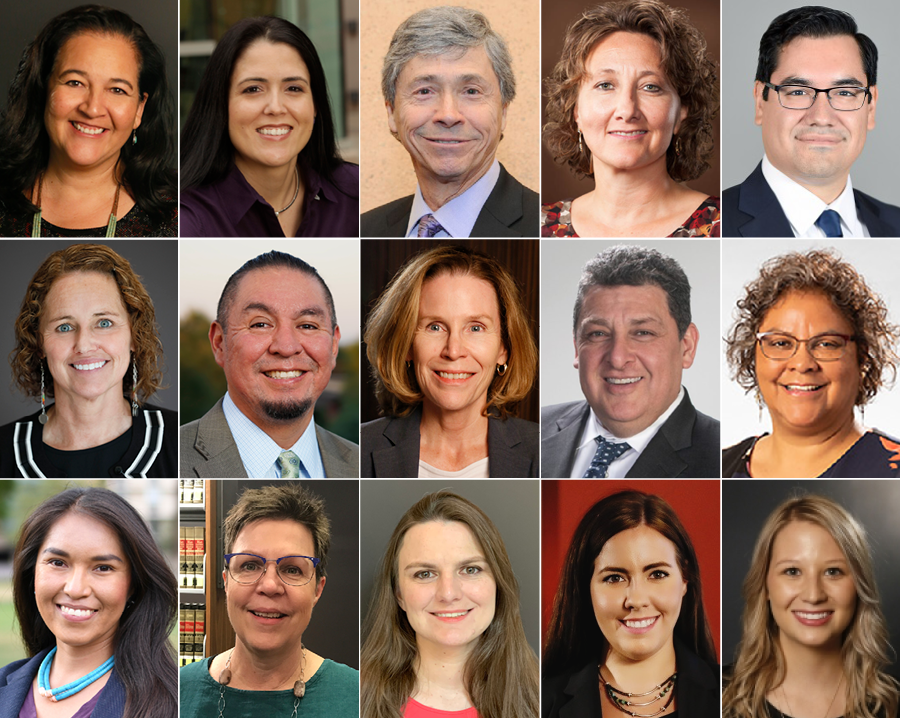
- Kate Rosier (Comanche), ILP Executive Director and Assistant Dean of Institutional Progress
- Patty Ferguson-Bohnee (Pointe-au-Chien), ILP Faculty Director and Indian Legal Clinic Director
- Professor Robert Miller (Eastern Shawnee), Willard H. Pedrick Distinguished Research Scholar and Director of the Rosette LLP American Indian Economic Development Program
- Professor Stacy Leeds (Cherokee), Foundation Professor of Law and Leadership
- Professor Trevor Reed (Hopi), Associate Professor of Law
- Professor Ann Marie Bledsoe Downes (’94) (Winnebago Tribe of Nebraska), Professor of Practice and Director of the Indian Gaming and Tribal Self-Governance Programs
- Professor Derrick Beetso (’10) (Navajo), Director of the Indian Gaming and Tribal Self-Governance Programs
- Professor Helen Burtis (’07), Faculty Associate
- Professor Lance Morgan (Winnebago Tribe of Nebraska), Faculty Associate
- Professor Pilar Thomas (Pascua Yaqui Tribe of Arizona), Faculty Associate
- Danielle Williams (Navajo), Program Coordinator Sr
- Theresa Beaulieu (Stockbridge-Munsee), Program Coordinator
- Honore Callingham (’18), Senior Specialist, Indian Legal Clinic
- Torey Dolan (’19) (Choctaw Nation of Oklahoma), Native Vote Policy Fellow, Indian Legal Clinic
- Blair Tarman (’21) (Chickasaw), Native Vote Policy Fellow, Indian Legal Clinic
In addition to the JD program, we also offer a Master of Laws (LLM) program and Master of Legal Studies (MLS) program.

- Paul Spruhan, Faculty Associate
- Jay Spaan (Cherokee), Faculty Associate
- Michael Hoenig, Faculty Associate
We’ve expanded our presence in Nebraska, California and Washington, D.C. We are a growing network because law is a growing field. Over 375 ILP students have graduated from ASU Law and over 150 received a certificate in Indian Law.
Today, we are proud to have 72 students representing 36 tribes: 44 JD, 1 LLM and 27 MLS.
To our entire ILP family: Happy Native American Heritage Month!
Impacts of Indian Gaming

The Indian Gaming and Tribal Self-Governance programs hosted a presentation “Indian Gaming in Texas: Ysleta del Sur Pueblo v. Texas & Alabama-Coushatta Tribe of Texas v. Texas” on Nov.10. Ronnie Thomas, treasurer for the Alabama-Coushatta Tribe, and Fred Petti, attorney for the Alabama-Coushatta Tribe, joined the ILP to discuss the history of Indian gaming in Texas and how Ysleta del Sur Pueblo v. Texas ended up before the Supreme Court. The Alabama-Coushatta Tribe submitted amicus briefs in support of the matter since the holding could result in ground-sweeping changes in how Indian gaming is conducted in Texas.
Lunch was provided at this in-person event, which was also livestreamed so the ILP’s MLS and LLM online students could participate as well. Derrick Beetso (’10), director of the Indian Gaming and Tribal Self-Governance programs, said, “I really enjoyed this event. The representatives from the Alabama-Coushatta Tribe shared important and interesting perspectives on how amici can help further collective litigation goals in Indian Country. I thought it was an important and practical discussion to have that is not always explained in law school courses.”

“I’m inspired by the actions of the Alabama-Coushatta Tribe because the purpose of pursuing legal action was not solely about Indian gaming, but how this activity could serve the tribe for the next seven generations,” said 3L Hilary Edwards . “Mr. Thomas shared how his tribal community has benefitted from the tribal gaming facility, like supporting tribal members to achieve higher education. I was encouraged when Mr. Thomas said, ‘We encourage our tribal students who achieve higher education to get off-reservation experience and then bring that experience back to work for the tribe.’ This is precisely what I strive to accomplish. I desire to be qualified with experience to be able to contribute and serve my tribal community. These events further validate my decision to attend law school and further encourages me to continue on with the fight.”
Celebrating NALSA
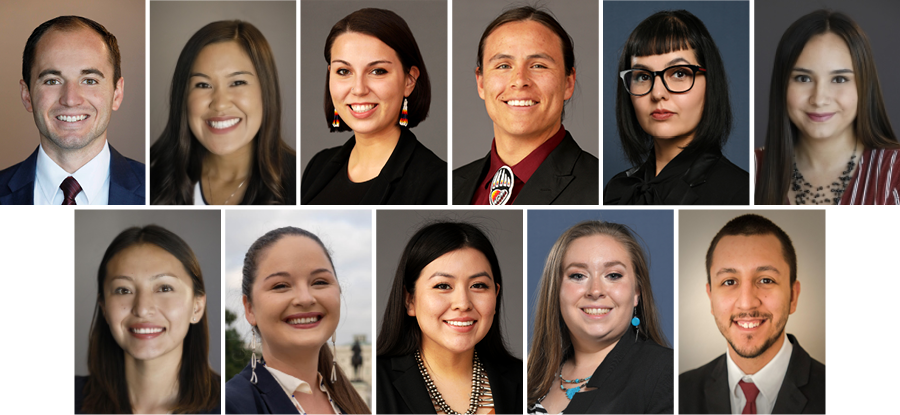
Twelve ASU Native American Law Students Association (NALSA) students received the Native American Bar Association of Arizona (NABA-AZ) Scholarship for their academic achievement at the “NABA-AZ Seven Generations Virtual Awards Event and Silent Auction.” Congratulations to all the recipients, especially our ILP students: Hilary Edwards (3L), Dallon Echo Hawk (3L), Brittany Habbart (2L), Michael LaValley (2L), Victorialyn McCarthy (1L), Brianna Minjarez (3L), Cierra Moore (3L), Lena Neuner (2L), Taylor Norman (2L), Autumn Shone (2L), Alexandra Trousdale (1L) and Ruben Zendejas (2L).
“NABA-AZ is proud to support these talented law students,” said NABA-AZ President and ILP Executive Director Kate Rosier. “The future is bright!”
We appreciate the committed support of NABA-AZ.
Performing Estate Planning in Indian Country
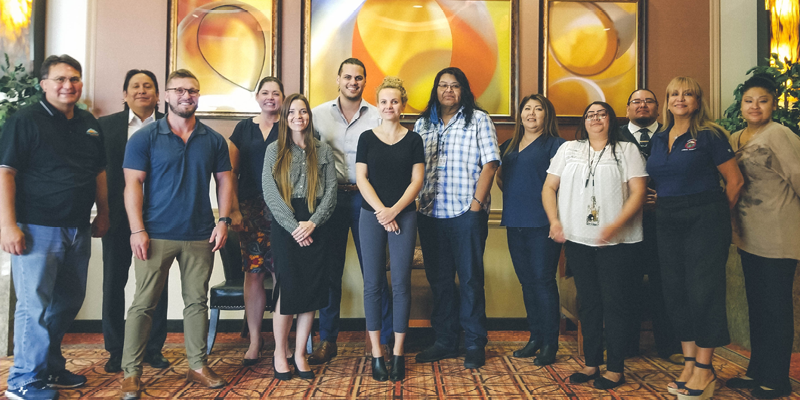
The Indian Legal Clinic successfully and safely completed two in-person Indian Wills Clinics with Quechan Indian Tribe and Pechanga Band of Luiseño Indians. Under the direction of Professor Helen Burtis (’07), 3L student attorneys Jacob Broussard, Liliana Elliot, Lindsay Ficklin, Zaine Ristau and Dwight Witherspoon drafted estate planning documents that are designed to provide allotment owners with wills that conform to the provisions of American Indian Probate Reform Act. The past few years have highlighted the need for elders especially to execute Indian wills.
In September, the clinic executed 14 wills for members of the Quechan Indian Tribe near Yuma, Arizona. In October, the clinic executed 16 wills for members of the Pechanga Band of Luiseño Indians in Temecula, California.
Students appreciated the hands-on experience with Native American clients, especially being able to interact with clients in person again, albeit with safety precautions. “I find doing the Wills Clinic really rewarding,” said Elliott. “I learned a lot that I think will be helpful as a future Indian Law attorney.”
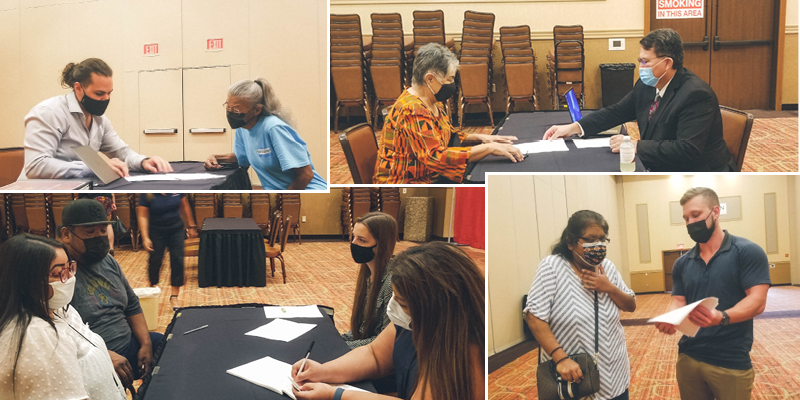
Witherspoon added, “I appreciate working with Native American clients and assisting them with their allotments that pertain specifically to Native American clients in addressing their estate planning needs.”
We appreciate the tribes for their generous hospitality and hosting the Indian Wills Clinic at their facilities. The clinic is planning additional Indian Wills Clinics for next semester.
Innovative Traveling Class
This year, 26 ILP students spent their fall break in Washington, D.C. for the “Federal Advocacy for the Tribal Client” traveling class. The class offers practical application of the government-to-government relationship, which was led by ASU Law’s Indian Gaming and Tribal Self-Governance Director Derrick Beetso (’10).
With the support and commitment from ASU Law and ILP alumni, and other innovative professionals volunteering their time, the students gained a valuable learning experience. The volunteers included Saba Bazzazieh (’08), Allison Binney (’00), Tana Fitzpatrick (’08), Charlie Galbraith (’06), Brian Gunn, Sam Hirsch, Krystalyn Kinsel (’15), Matthew Murdock (’13), Sarah Murray, Breann Swann Nu’uhiwa (LLM ’09), Rebecca Ross (’10), Stephanie Sfiridis (’16), Ryan Smith (’98), Joel West Williams, Rani Williams (’18), the Office of Tribal Justice at the Department of Justice, the Office of Regulatory Affairs at the Department of the Interior, the Office of the Assistant Secretary-Indian Affairs, the House Subcommittee for Indigenous Peoples, and the Senate Committee on Indian Affairs.
In addition to participating in the class, students met with ILP partners and supportive law professionals. On Oct. 13, students, alumni, faculty and friends joined together at the Arizona State University Barrett and O’Connor Center for our D.C. Mixer. Thank you to everyone who was able to attend!
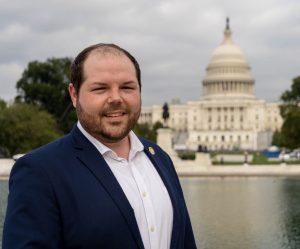 “The course could potentially open so many doors to exciting new possibilities,” said MLS Richard Picard. “While no one could ever replace Professors Ann Marie Bledsoe Downes and Larry Roberts, Professor Beetso is a wonderful addition to the ASU team as his dedication and excitement for the future of Indian Country truly reverberates through his instruction.”
“The course could potentially open so many doors to exciting new possibilities,” said MLS Richard Picard. “While no one could ever replace Professors Ann Marie Bledsoe Downes and Larry Roberts, Professor Beetso is a wonderful addition to the ASU team as his dedication and excitement for the future of Indian Country truly reverberates through his instruction.”
For additional photos and student testimonials, take a look at our social media posts that include 3L Hilary Edwards and 2L Michael LaValley.
We appreciate the following firms for taking time to talk with our students and hosting meals: Brownstein Hyatt Farber Schreck, Powers Pyles Sutter & Verville PC; Hobbs Straus Dean & Walker, LLP; Rosette, LLP; Jenner & Block; Sonosky, Chambers, Sachse, Endreson & Perry, LLP; and Akin Gump Strauss Hauer & Feld LLP.

